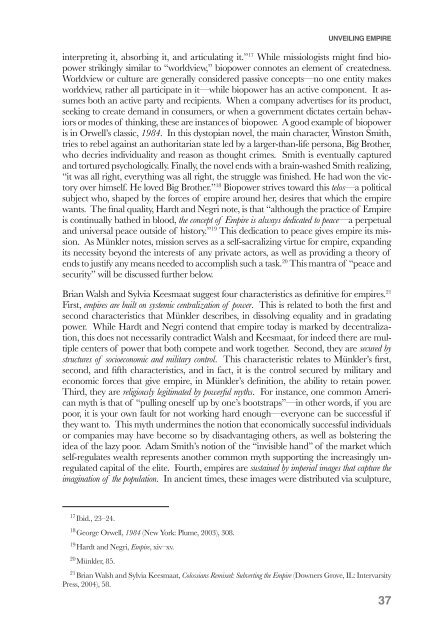VULNERABLE MISSION
VULNERABLE MISSION
VULNERABLE MISSION
Create successful ePaper yourself
Turn your PDF publications into a flip-book with our unique Google optimized e-Paper software.
UNVEILING EMPIRE<br />
interpreting it, absorbing it, and articulating it.” 17 While missiologists might find biopower<br />
strikingly similar to “worldview,” biopower connotes an element of createdness.<br />
Worldview or culture are generally considered passive concepts—no one entity makes<br />
worldview, rather all participate in it—while biopower has an active component. It assumes<br />
both an active party and recipients. When a company advertises for its product,<br />
seeking to create demand in consumers, or when a government dictates certain behaviors<br />
or modes of thinking, these are instances of biopower. A good example of biopower<br />
is in Orwell’s classic, 1984. In this dystopian novel, the main character, Winston Smith,<br />
tries to rebel against an authoritarian state led by a larger-than-life persona, Big Brother,<br />
who decries individuality and reason as thought crimes. Smith is eventually captured<br />
and tortured psychologically. Finally, the novel ends with a brain-washed Smith realizing,<br />
“it was all right, everything was all right, the struggle was finished. He had won the victory<br />
over himself. He loved Big Brother.” 18 Biopower strives toward this telos—a political<br />
subject who, shaped by the forces of empire around her, desires that which the empire<br />
wants. The final quality, Hardt and Negri note, is that “although the practice of Empire<br />
is continually bathed in blood, the concept of Empire is always dedicated to peace—a perpetual<br />
and universal peace outside of history.” 19 This dedication to peace gives empire its mission.<br />
As Münkler notes, mission serves as a self-sacralizing virtue for empire, expanding<br />
its necessity beyond the interests of any private actors, as well as providing a theory of<br />
ends to justify any means needed to accomplish such a task. 20 This mantra of “peace and<br />
security” will be discussed further below.<br />
Brian Walsh and Sylvia Keesmaat suggest four characteristics as definitive for empires. 21<br />
First, empires are built on systemic centralization of power. This is related to both the first and<br />
second characteristics that Münkler describes, in dissolving equality and in gradating<br />
power. While Hardt and Negri contend that empire today is marked by decentralization,<br />
this does not necessarily contradict Walsh and Keesmaat, for indeed there are multiple<br />
centers of power that both compete and work together. Second, they are secured by<br />
structures of socioeconomic and military control. This characteristic relates to Münkler’s first,<br />
second, and fifth characteristics, and in fact, it is the control secured by military and<br />
economic forces that give empire, in Münkler’s definition, the ability to retain power.<br />
Third, they are religiously legitimated by powerful myths. For instance, one common American<br />
myth is that of “pulling oneself up by one’s bootstraps”—in other words, if you are<br />
poor, it is your own fault for not working hard enough—everyone can be successful if<br />
they want to. This myth undermines the notion that economically successful individuals<br />
or companies may have become so by disadvantaging others, as well as bolstering the<br />
idea of the lazy poor. Adam Smith’s notion of the “invisible hand” of the market which<br />
self-regulates wealth represents another common myth supporting the increasingly unregulated<br />
capital of the elite. Fourth, empires are sustained by imperial images that capture the<br />
imagination of the population. In ancient times, these images were distributed via sculpture,<br />
17 Ibid., 23–24.<br />
18 George Orwell, 1984 (New York: Plume, 2003), 308.<br />
19 Hardt and Negri, Empire, xiv–xv.<br />
20 Münkler, 85.<br />
21 Brian Walsh and Sylvia Keesmaat, Colossians Remixed: Subverting the Empire (Downers Grove, IL: Intervarsity<br />
Press, 2004), 58.<br />
37


